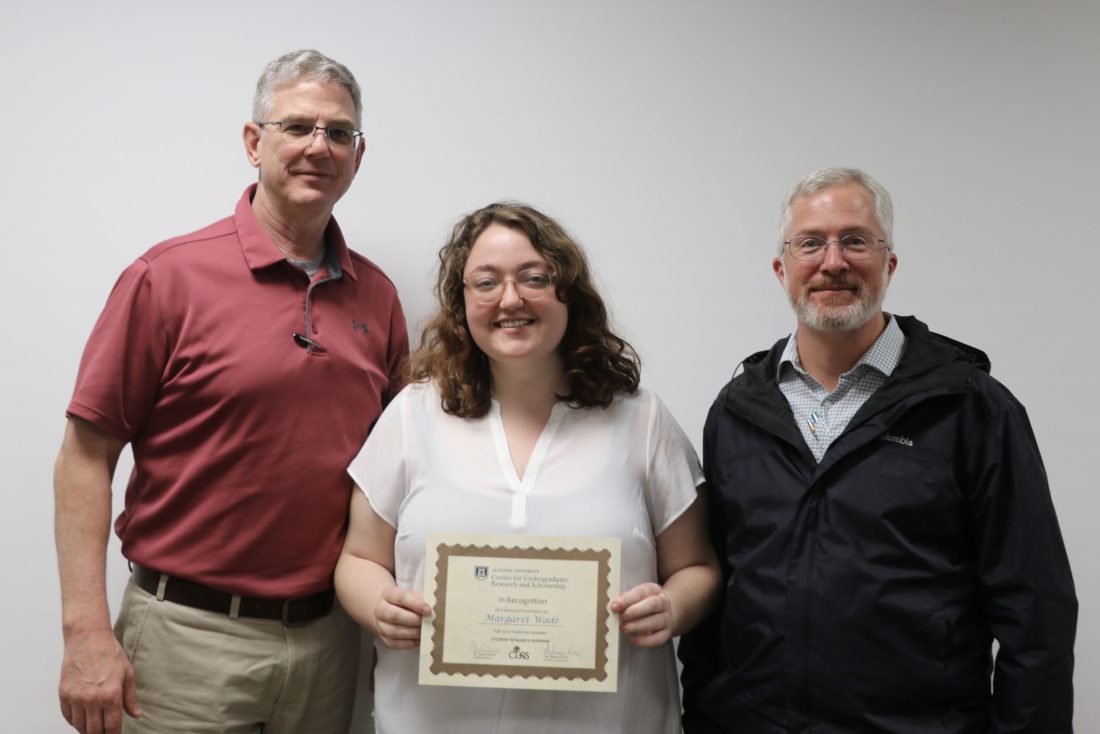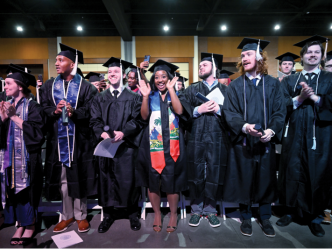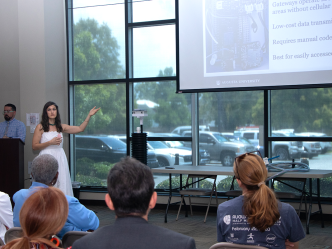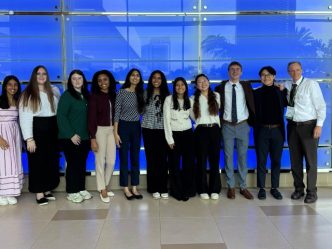Margaret Wade, a senior with a double major in physics and chemistry, has been selected by the National Council on Undergraduate Research to present her research to members of the United States Congress.
Her presentation, “Designing and Testing a Low-cost Arduino-based Turbidimeter,” will be delivered virtually during a special outreach event, Posters on the Hill 2022.
Out of hundreds of applicants for Posters on the Hill, Wade was one of 60 selected.
Not only does this event allow students and their mentors to showcase their research, but it also advocates for support of undergraduate research at the federal level by engaging members of Congress.
About Wade
Originally from Valdosta, Georgia, Wade was a pre-med biology major when she first came to Augusta University in 2018. However, she quickly came to enjoy her chemistry and physics courses. As a first-semester freshman participating in the College of Science and Mathematics’ Living Learning Communities, she jumped straight into organic chemistry and, to the delight of Dr. Thomas Gardiner, the director of the LLC, she made an A in the course, and in the second organic course as well. It wasn’t long before she changed her major to chemistry.
During her undergraduate journey at Augusta University, Wade also enrolled in physics courses, including three taught by Dr. Andy Hauger, Fuller E. Callaway Professor of Physics. Wade fell in love with physics and declared it her second major. She’s now a familiar face in the electronics lab.
“What I enjoy most about physics is the methodical nature of the problems, and how you can learn concepts and work a few simple problems and then take that knowledge and apply it to solve a more difficult problem,” she said.
In the spring semester of 2021, Wade took Hauger’s Introduction to Physical Computing course and impressed him with her project. Despite never before using the sensor device in her project, she found a way to get it to work without using a library for code commands.
“I refer to her as the Navy SEAL of the department: She can do anything and everything very well,” Hauger said. “This includes theoretical work, computational work, and grinding it out in the lab. Her talent is exceptional by any measure.”
Wade, now poised to graduate, has received admission offers from several graduate schools. Having found her experiences in the electronics lab to be especially fulfilling, she plans to enroll in an electrical engineering PhD program this fall. Her goal is to learn the skills necessary to be an independent researcher and, ultimately, to teach and work in academia.
About the research
Wes Byne, director of Augusta Utilities, and Oscar Flite, stormwater services manager at the Augusta Engineering Department, have worked with Hauger on numerous projects over several years. So when a need emerged to create a low-cost water quality monitoring sensor, Hauger immediately turned to Wade.
Wade eagerly accepted the opportunity and started on the project during the summer of 2021, collaborating with Byne, Flite and Hauger.
Augusta Utilities uses commercial turbidimeters to monitor Augusta’s water quality. However, commercial turbidimeters are expensive and limited in use as they must be fixed in stationary positions. In addition, their high cost limits the number of units available for use. The end goal, as Byne and Flite explained, was to develop a less expensive system capable of more widely monitoring turbidity and water quality throughout the city.
Wade took on the challenge to design and develop an inexpensive device to measure turbidity, one which would have the advantage of being portable.
Turbidity, a prime indicator of overall water quality, is related to the amount of particulate matter suspended in a water sample. One way to measure this is to send light through a sample and measure how much light is scattered and how much light is transmitted through it. The device designed and tested by Wade used a light intensity sensor, which was interfaced to a microcontroller for data collection. Wade had to perform countless experiments to calibrate the circuit.
Another challenge was to design and produce an enclosure that prevents ambient light from influencing the measurement. Meeting this challenge turned out to be one of Wade’s most significant accomplishments. Even though she had no prior experience in 3D printing, Wade learned how to create a light-tight enclosure and to tune the 3D printer to produce high-quality components. Her design was a breakthrough.
“Margaret was a great student, and very astute researcher, and a pleasure to work around. She delivered top-quality data, conducted and replicated her experiments, and described her methods clearly,” Byne said. “Ms. Wade is well on her way to making a difference, and we are proud to have worked with her.”
Wade has presented her work at the Phinizy Water Sciences Center and at the Center for Undergraduate Research and Scholarship‘s research seminar. Wade impressed many people, including Dr. Quentin Davis, director of CURS. It was Davis who recommended that she submit her abstract to the Posters on the Hill conference.
Social and scientific impact
Being one of its kind at the federal level, the Posters on the Hill program celebrates the impressive research accomplished by undergraduates. Presenters have the unique opportunity to speak directly to members of Congress, who in turn can establish programs that support undergraduate research.
Not only has Wade made an impact by creating a novel, low-cost water quality sensor, she (along with the other presenters) is drawing attention to the value of undergraduate research. Nothing validates the value of undergraduate research more effectively than the words and stories directly from the student researchers themselves.
“We are very excited and proud of her. It is very important that the next generation of researchers realize that there are many valuable areas to study, and they need to be recognized to encourage their continued development in the applied sciences,” Byne said.
“It is an exhilarating experience for me because the selection process was very competitive for this conference, and I am very happy that my abstract was selected. This is a very rewarding experience,” Wade said.
 Augusta University
Augusta University




